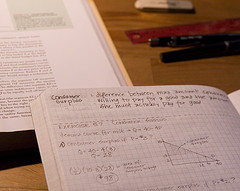Microeconomics is the branch of Economics that analyzes firms, individuals and households’ decision-making processes, behaviors and interactions that affect the allocation of limited resources of the society. In short, it examines the behavior of individual economic units.
In particular, Microeconomics focuses on patterns of supply and demand and the determination of price and output in individual markets. It concerns itself with individual economic activity and decision-making process that eventually determines the relative prices and the distribution of the economy’s output.
With the assumption of rational self-interest, the dynamics of Microeconomics lies in the individual and group choices of the society. Choices typically requires time, effort and information, which are all scarce and valuable.
Major notions and theories developed in Microeconomics include:
- Surplus, the theoretical incentive behind all economic activities, or plainly put as human wants.
- Supply and demand, the ultimate law that governs Microeconomics.
- Elasticity, a tool describing how a variable changes upon the shift of another.
- Utility theory. Utility is a term used to refer to the satisfaction derived from the consumption of goods and services. Two basic utility concepts, namely total utility and marginal utility are essential for you to understand when using this tool for microeconomic analysis.
- Consumer theory. It is a theory based on the concept of utility that examines how economically rational households maxmize their satisfaction by spending limited income on goods and services.
- Prodution / producer theory is comprised of major principles of production / cost firms follow to make efficient reallocation of resources to provide to the market in the hope of gaining profit by adding value to the final products.
- Price theory. Price is the governing dynamics of all markets and the most important integral factor we care about when looking at markets. Therefore the price theory presents an analytical approach to the operation of markets and the behaviors of sellers and buyers.
- Cost theory. Cost is the payments by firms for the factors of production, and cost theory makes the major part of the firms behavioral analysis.
- Market theory and competition consists of the various forms of market and competition theories.
- …






